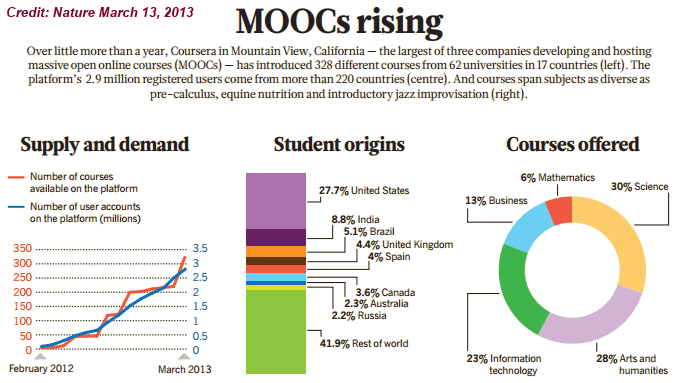|
|
|
|
|
|
|
News & Views item - March 2013 |
![]() Nature Features the MOOC. (March 14, 2013)
Nature Features the MOOC. (March 14, 2013)
In the March 14, 2013 issue of Nature feature editor M. Mitchell Waldrop spends some 2,800 words assessing the effects on tertiary education of the rapidly expanding proactive interest in Massive Open Online Courses (MOOCs).
________________________________________________________

_________________________________________________
His final three paragraphs sum matters up succinctly and cogently:
No one knows exactly where that restructuring might end up. Lectures becoming a rarity, for example? Vast numbers of students getting their degrees entirely online? But the revolution has already begun, says Stevens [Mitchell Stevens, a sociologist at Stanford and one of the leaders of an ongoing, campus-wide discussion series known as Education's Digital Future.]. Major universities such as Stanford are taking the lead, “trying to integrate and embed digital learning into the fabric of the entire university” — and trying to master the new technology before it masters them.
Virtually everyone participating in this upheaval agrees on one thing. Colleges and universities will change — perhaps dramatically — but they will not disappear. “No one says that all education has to be online,” says Thrun [Sebastian Thrun Google VP and Fellow, and part-time Research Professor at Stanford University.]. “Sometimes, a classroom is better.” Especially in communal endeavours such as science, “education is more than just knowledge”, says Dede [Chris Dede, studies educational technologies at Harvard]. “It's abilities like leadership and collaboration, and traits like tenacity”, all of which are best learned face to face.
An unspoken irony weaves through almost every discussion about MOOCs: thanks to innovations such as flipping, online technology's most profound effect on education may be to make human interaction more important than ever. As Krakauer [David Krakauer External Professor, Santa Fe Institute; Director, University of Wisconsin, Madison, Wisconsin Institute for Discovery] puts it, “what's absolutely clear is that the very large lecture hall can be completely replaced: there's no value added over watching it at home on an iPad screen with a cup of tea. But there is also no substitute for a conversation.”